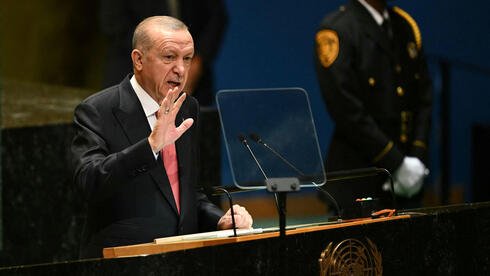The recent Pahalgam terror attack in Kashmir, which killed 26 innocent civilians, has once again exposed a dangerous and evolving nexus that connects Turkey, Pakistan, and Islamist extremist networks. The attack, carried out by The Resistance Front (TRF), widely recognized as a front for the Pakistan-based Lashkar-e-Taiba (LeT), not only reflects the continued threat of terrorism in South Asia but also highlights Turkey’s emerging role as a silent enabler in this volatile equation.
While the Kashmir conflict has long been dominated by Indo-Pakistani rivalries, Turkey’s deepening involvement introduces a new and troubling dimension that threatens not only regional but also global security, including the stability of Israel.
Under President Recep Tayyip Erdoğan, Turkey has shifted from being a predictable NATO ally to an assertive player pursuing its own ideological and strategic ambitions. This shift is characterized by growing military and diplomatic cooperation with Pakistan, formalized through agreements and bolstered by substantial defense exports.
Turkey has emerged as Pakistan’s second-largest arms supplier, delivering advanced military technology including drones, naval systems, and other hardware, even as Pakistan continues to harbor groups that sponsor cross-border terrorism. This cooperation is not merely transactional; it is driven by shared ideological leanings and a convergence of interests that challenge established regional power structures.
Turkey’s support for Pakistan’s position on Kashmir has been especially provocative. Erdoğan’s public statements, echoing Pakistan’s narrative, have emboldened Islamabad’s intransigence on the Kashmir issue and undermined efforts at peaceful resolution.
More troubling are the links between Ankara’s military and paramilitary structures, such as the controversial SADAT group, and alleged support for militant networks operating in South Asia and the Middle East.
While evidence remains circumstantial, reports of SADAT’s involvement in training or facilitating foreign fighters in conflict zones including Kashmir, Gaza, and Libya suggest a deliberate strategy of using proxies to advance Ankara’s geopolitical goals. These actions blur the lines between statecraft and ideological warfare, creating a dangerous precedent for other regional conflicts.
This evolving Turkey-Pakistan alliance extends beyond military collaboration into ideological solidarity, with Ankara positioning itself as a defender of Muslim causes worldwide. This narrative has been reinforced by Erdoğan’s rhetoric and Turkey’s diplomatic positioning in forums such as the United Nations. However, far from promoting stability or justice, this alignment has emboldened extremist factions and complicated peace efforts. It risks transforming Kashmir from a bilateral dispute into a battleground influenced by transnational jihadist narratives, further destabilizing an already fragile region. The prospect of Turkey’s military technology and covert support enhancing Pakistan’s capabilities to sustain proxy groups like TRF raises significant security concerns for South Asia and beyond.
Crucially, this dangerous nexus does not confine its threat to South Asia alone. Turkey’s growing ties with Pakistan and its apparent willingness to empower Islamist groups carry profound risks for Israel and its regional allies. Erdoğan’s public support for Hamas, his government’s ties to the Muslim Brotherhood, and Ankara’s increasingly antagonistic stance towards Israel are deeply alarming. By indirectly strengthening networks linked to Pakistan-based extremist groups, Turkey is contributing to a broader regional destabilization that threatens to embolden anti-Israel actors and shift the balance of power in ways that could spark wider conflict. The weapons, training, and ideological support flowing from Turkey to Pakistan could easily find their way into other theatres, from Kashmir to Gaza, where terror groups target Israeli civilians and infrastructure.
Israel, already grappling with threats from Hezbollah, Hamas, and other Iranian-backed proxies, now faces the added complication of a NATO member that is indirectly aiding and abetting networks hostile to Israeli security. The Turkey-Pakistan nexus not only undermines counterterrorism efforts but also emboldens radical elements that openly call for the destruction of Israel and attack American interests in the Middle East. The possibility of a stronger, ideologically driven axis stretching from Pakistan through Turkey and into the Levant should set off alarm bells in capitals from Jerusalem to Washington.
India has responded to this growing nexus with a combination of diplomatic and economic pressure, including suspending engagements with Turkey, restricting bilateral trade, and exploring new strategic partnerships. There is a palpable shift in New Delhi’s calculus as it recognizes that countering the threat from TRF and similar groups requires addressing not only Pakistan’s role but also the enablers like Turkey. This recalibration is mirrored by other regional powers who view Ankara’s assertive and ideological foreign policy as a destabilizing force that extends from the Eastern Mediterranean to South Asia.
 Amine Ayoub
Amine AyoubTurkey’s dual identity as a NATO member and a patron of radical networks presents a unique dilemma, as it complicates alliance politics and strains relationships with partners committed to fighting terrorism. The convergence of military aid, ideological rhetoric, and covert support for terror-linked networks threatens to embolden not only Pakistani proxies but also other extremist movements seeking validation and material support.
Amine Ayoub is a policy analyst and writer based in Morocco.

